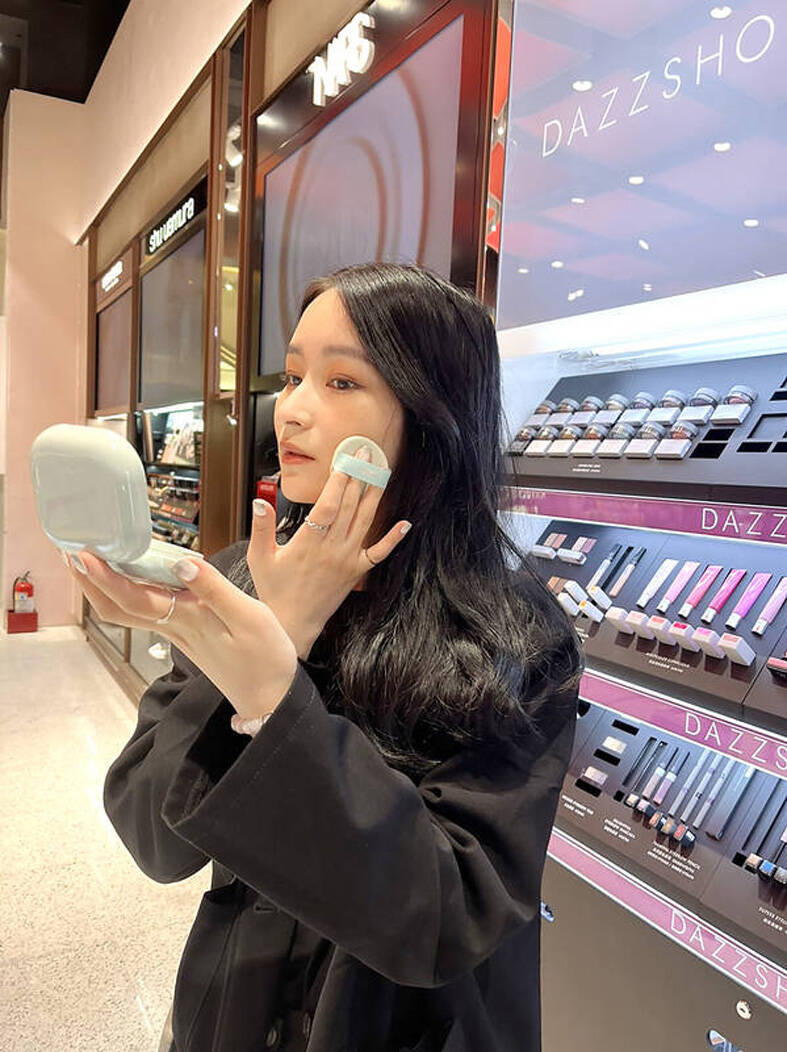Makeup users should ensure the cosmetics they use meet health standards and are applied properly, the Food and Drug Administration (FDA) said, recommending five rules to balance beauty with health.
Makeup products such as eye shadow, eyeliner, mascara, lipstick and lip gloss are held to stricter health standards than other makeup products, because they are applied close to the eyes and mouth, FDA Medical Devices and Cosmetics Division section head Chang Chia-jung (張家榮) said.
For example, only Class I colorants can be used in lip and eye makeup products to reduce irritation to lip and eye mucus membranes, Chang said.

Photo courtesy of Global Mall via CNA
Microbiological standards are stricter, as the microbial limit for eye and lip makeup is 100 colony-forming units per gram (cfu/g), while the general microbial limit for cosmetics is 1,000 cfu/g, he said.
When applying eye shadow, it is important to ensure the makeup brush is clean and to avoid touching the brush or product directly to prevent bacterial contamination, FDA examiner Fang Yun-shu (方韻淑) said.
When applying eyeliner, the pen should not move beyond the root of the eyelashes to prevent applying the product too close to the eyeball, which can cause irritation, Fang said.
When removing the mascara wand, twist and remove it gently to reduce air and bacteria from entering the product, she said.
When applying lipstick, clean the lips first to remove any food residue and to prevent bacteria from affecting product quality, she added.
The FDA recommended five rules for cosmetics that makeup users can follow to balance health and beauty.
First, choose products that are clearly labeled and that include the product name, directions and shelf life, it said.
Second, make sure that the product has been registered under the FDA’s cosmetic product platform, it said.
Third, only use cosmetics on the areas the product is approved for, it said.
For example, avoid using lip liner on the eyes, it added.
Fourth, regularly check to see if any products have expired, and fifth, pay practice good hygiene by keeping makeup tools clean and not sharing them with others, it added.
Test products provided at cosmetic stores are shared between shoppers and must comply with the Cosmetic Hygiene and Safety Act (化粧品衛生安全管理法), Chang said.
People should check test makeup to make sure it has not spoiled, and promptly alert a store employee if they find any issues, he said.
The process of removing makeup is equally important, especially as the eyes and lips are fragile, the FDA said.
Makeup remover should be poured on a cotton pad and gently applied to the eyes or lips for about 10 seconds to dissolve the makeup before gently removing it, it said.
Rubbing too hard to try and remove stubborn makeup can pull the skin and cause irritation, it added.
In related news, Taipei Tzu Chi Hospital pediatrician Chiu Hsin-hui (邱馨慧) on Saturday urged people to keep ear piercings clean and dry to prevent infection.
A 17-year-old student surnamed Chou (周) developed cellulitis and was hospitalized after repeatedly touching his ear piercings, leading to infection, swelling and a fever despite prior treatment, Chiu said.
A doctor surgically cleaned the infected tissue and placed a drainage tube in the ear cartilage, she said.
The site was infected with Pseudomonas aeruginosa and Chou recovered after two weeks on antibiotics, she said.
It is a common type of bacterium that grows well in humid environments and mostly appears in surgical wounds or areas with tissue fluid, she added.
Additional reporting by Wong Yu-huang

The Coast Guard Administration (CGA) yesterday said it had deployed patrol vessels to expel a China Coast Guard ship and a Chinese fishing boat near Pratas Island (Dongsha Island, 東沙群島) in the South China Sea. The China Coast Guard vessel was 28 nautical miles (52km) northeast of Pratas at 6:15am on Thursday, approaching the island’s restricted waters, which extend 24 nautical miles from its shoreline, the CGA’s Dongsha-Nansha Branch said in a statement. The Tainan, a 2,000-tonne cutter, was deployed by the CGA to shadow the Chinese ship, which left the area at 2:39pm on Friday, the statement said. At 6:31pm on Friday,

The Chinese People’s Liberation Army Navy’s (PLAN) third aircraft carrier, the Fujian, would pose a steep challenge to Taiwan’s ability to defend itself against a full-scale invasion, a defense expert said yesterday. Institute of National Defense and Security Research analyst Chieh Chung (揭仲) made the comment hours after the PLAN confirmed the carrier recently passed through the Taiwan Strait to conduct “scientific research tests and training missions” in the South China Sea. China has two carriers in operation — the Liaoning and the Shandong — with the Fujian undergoing sea trials. Although the PLAN needs time to train the Fujian’s air wing and

The American Institute in Taiwan (AIT) put Taiwan in danger, Ma Ying-jeou Foundation director Hsiao Hsu-tsen (蕭旭岑) said yesterday, hours after the de facto US embassy said that Beijing had misinterpreted World War II-era documents to isolate Taiwan. The AIT’s comments harmed the Republic of China’s (ROC) national interests and contradicted a part of the “six assurances” stipulating that the US would not change its official position on Taiwan’s sovereignty, Hsiao said. The “six assurances,” which were given by then-US president Ronald Reagan to Taiwan in 1982, say that Washington would not set a date for ending arm sales to Taiwan, consult

A Taiwanese academic yesterday said that Chinese Ambassador to Denmark Wang Xuefeng (王雪峰) disrespected Denmark and Japan when he earlier this year allegedly asked Japan’s embassy to make Taiwan’s representatives leave an event in Copenhagen. The Danish-language Berlingske on Sunday reported the incident in an article with the headline “The emperor’s birthday ended in drama in Copenhagen: More conflict may be on the way between Denmark and China.” It said that on Feb. 26, the Japanese embassy in Denmark held an event for Japanese Emperor Naruhito’s birthday, with about 200 guests in attendance, including representatives from Taiwan. After addressing the Japanese hosts, Wang